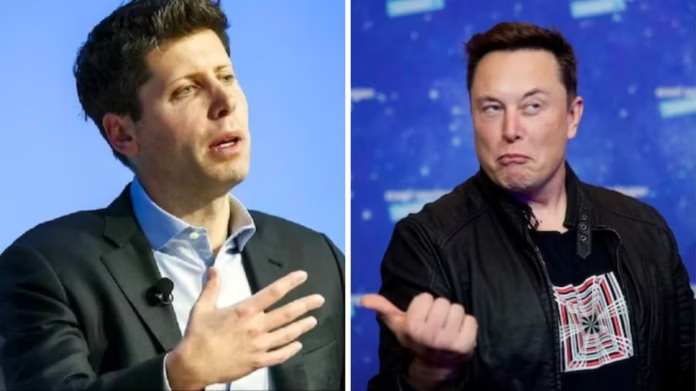
Power Moves, Quiet Reversals, and a Brewing Legal Showdown
• Elon Musk’s legal and investor pressure halts OpenAI’s controversial pivot to for-profit status
• OpenAI recommits to nonprofit governance after high-level talks in California and Delaware
• Sam Altman says “I think it just sets us up to be a more understandable structure”
By Samuel Lopez – USA Herald
In a stunning reversal that marks a pivotal moment in the evolution of artificial intelligence governance, OpenAI has officially abandoned its plans to become a for-profit entity—dealing a powerful win to its co-founder and now-critic, Elon Musk.
The decision reaffirms OpenAI’s original nonprofit structure and puts to rest months of boardroom chaos, legal wrangling, and high-stakes power plays that pitted Musk against CEO Sam Altman and other corporate visionaries. After Musk’s fierce objections—including lawsuits and a takeover bid—the organization has opted to preserve its nonprofit mission and structure, as originally envisioned in its 2015 founding charter.
“This is maybe less eventful than people were expecting,” Altman said in a press conference following the announcement. “But I think it just sets us up to be a more understandable structure.”
Musk vs. Altman: A Battle for AI’s Future
The conflict over OpenAI’s governance structure traces back to November 2023, when CEO Sam Altman was briefly ousted by the board, only to return days later amid widespread backlash. The leadership shakeup fueled growing concerns that OpenAI’s ambitions were drifting toward privatization and away from its public-benefit roots.
Elon Musk, who seeded OpenAI with an initial $100 million investment and co-founded the venture with the vision of making AI safe for humanity, became increasingly vocal in opposing what he viewed as a betrayal of the nonprofit ethos. When OpenAI announced its intent to transition into a fully for-profit enterprise, Musk took swift action—filing lawsuits, issuing public rebukes, and reportedly leading a group of investors in a bid to wrest control of the company.
OpenAI’s decision to walk back those plans and remain under the governance of its nonprofit board is a rare corporate climbdown—and one that legal experts say may neutralize some of Musk’s pending legal claims.
Still, it remains to be seen whether Musk will withdraw the lawsuits or continue pressing for additional reforms and transparency.
California and Delaware Talks Played a Role
According to OpenAI insiders, the reversal came after extended discussions with regulators, legal experts, and nonprofit governance advisors in both California and Delaware. These jurisdictions are pivotal because OpenAI’s nonprofit is registered in California, while much of the regulatory oversight and corporate governance law relevant to the case stems from Delaware.
The shift is also likely a strategic legal move. Had OpenAI pursued the restructuring, it would have been forced to reconcile multiple complex compliance issues and risked further scrutiny under nonprofit fiduciary law, especially with Musk’s legal artillery trained on the board.
The Microsoft Factor and the Future of Profit Limits
OpenAI’s current operational structure is a hybrid model: a nonprofit entity owns and governs a capped-profit subsidiary that accepts private investment. Microsoft, one of the largest investors, has poured billions into OpenAI and integrated its GPT models into products like Bing and Office 365.
Yet even Microsoft’s profits are subject to what OpenAI calls a “100x return cap”—a clause that limits investors to making no more than 100 times their initial investment. That controversial mechanism, which could be unilaterally reduced by the nonprofit board, has sparked unease among some Silicon Valley investors who now see Musk’s intervention as a bulwark against future instability.
The Stakes of Capital Deployment
Perhaps the most significant part of OpenAI’s recommitment to nonprofit control is what it means for resource allocation. Altman hinted that the nonprofit is now preparing to deploy large sums of capital into mission-driven projects, further differentiating it from private tech giants.
Observers speculate this could include grants, academic partnerships, or public AI infrastructure—projects that might have been deprioritized under a for-profit framework.
A Symbolic and Strategic Win for Musk
While Musk remains one of the most polarizing figures in tech, few can deny the impact of his pressure campaign. Legal analysts say OpenAI’s decision represents both a symbolic and strategic concession.
“Musk’s actions forced a reckoning within OpenAI’s leadership,” said tech attorney Lawrence Wilcox. “Whether or not he wins in court, he’s already achieved significant structural reform.”
Some speculate Musk may now use this momentum to push for greater AI transparency across the industry, especially amid his own ventures like xAI and Neuralink.
Will Musk Drop the Lawsuit?
That question remains unanswered. In March, Musk filed a lawsuit accusing OpenAI of breach of contract, asserting that the company had strayed from its founding mission of benefiting humanity over profit. Whether OpenAI’s course correction satisfies his concerns—or whether more demands will follow—remains to be seen.
One thing is certain: the tech world is watching.
Final Thoughts
OpenAI’s decision to halt its for-profit shift reaffirms a broader public dialogue about how artificial intelligence should be developed, governed, and funded. With safety, equity, and ethics at the core of the AI debate, the nonprofit’s rededication to public benefit could influence future legal, regulatory, and investor decisions in the rapidly evolving AI ecosystem.
While Sam Altman insists the move is a pragmatic, almost boring solution, the implications are anything but. For Elon Musk and the many who share his concerns, this marks a turning point—and perhaps a warning to other tech ventures contemplating similar pivots.
As always, only time will tell whether the détente holds or becomes just another chapter in the saga of Silicon Valley’s most volatile industry.
Explore More
🔗 Follow us on X @RealUSAHerald


